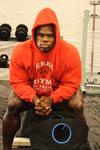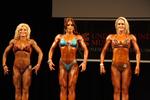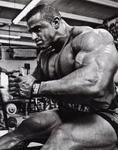|
Scattered focus resulting from an inability to control our emotions - for example, allowing negative thoughts to appear when trying visualise success - will significantly impact athletic performance; being aware of one’s surroundings to the extent that hearing conversations and observing what others are doing becomes routine when training, for instance, will seriously dilute the amount of intensity that can be generated throughout your workout. By ‘letting your mind wander’ you place yourself at a major disadvantage compared to those who have mastered the art of channeling their focus to the exclusion of all else.
The successful among us have long known that trying to focus on several tasks at once causes their attention to oscillate, which leads to confusion, mental stress and, ultimately, a tremendous waste of time and effort. To fulfill a task to the best of one’s abilities it is imperative that they place all of their focus on the work at hand. Completing a heavy set of squats, for example, requires that all of our mental energy is directed toward the flexing and contracting of the specific muscles recruited to complete this set. Anything less than total focus will affect performance and dilute training intensity.
 
Now, how many of us are immune from the wandering mindset that plagues those for whom complete focus is a much needed, but seldom realised objective? How many of us are able to zero in on our target like a lion stalking his prey, with complete concentration and the kind of sharply-honed killer instinct needed to promote the finely-tuned nervous system awareness and calculated psyche of one who is in complete control of their destiny and who knows, with certainty, exactly what needs to be done and how to do it?
I think it would be fair to say that unless you have inherited the cyborg gene, whereupon your half human/half machine status would serve you well in your quest to block out all that is extraneous to reach your goals, most of us have at least some degree of difficulty fully controlling our emotions when aiming to focus on a specific outcome.
Achieving great bodybuilding success involves - to a major extent - ignoring the world while you go about the business of training for maximal gains in muscle size. You must be conscious of what you are doing at all times, never once letting your thoughts stray to stimuli that is of little relevance to what you are trying to accomplish: working a muscle through a full range of motion, with complete attention given to this act.
Directed consciousness is the necessary component directly related to a heightened attention span and, as would naturally follow when it is properly fostered, quality workouts. Without the unbreakable focus such deep emergence in the training process engenders, a session might, at best, be seriously compromised in terms of intensity and training progression (weights lifted or number of reps completed), at worst, a plodding half-hearted excursion with little to show for your efforts.
To gain freedom over the conflicting emotions which may limit any mastery we might have over ourselves it is important to ensure that we learn how to focus our attention, for to be in control of your consciousness results from both an improved attention span and pinpoint focus. Without an ability to properly attend to what we are doing we may lose control over our consciousness and if this happens we will have essentially lost control over ourselves.
 
To gain mastery over ourselves requires an ability to channel our thoughts: by directing your attention to what you want to hear, see and think you will find the task of building muscle not only a much easier one but a more fruitful enterprise.
Here is a little exercise that can be used to help improve your ability to selectively attend to what is most important to you. In a room full of people talking simultaneously, position yourself near to where you can clearly hear at least three conversations. Once you have determined that your eves-dropping will be a success, listen to one conversation for 30 seconds – in the process blocking all else out – before switching to another discussion for another 30 seconds, followed by the third, and final, conversation (for a further 30 seconds) – (you might wish to fake reading a book during this exercise to avert any suspicion toward you, as you will be naturally inclined to look to where the conversation is taking place thus attracting the attention of your unwitting subjects).
Once you have listened to the three conversations, switch back to the first, and repeat the process, each time working to further intensify your attention so as to focus solely on the conversation you are attending to. Over time your ability to avoid attending to conversations other than those you are to be focused upon will improve. Another, similar, method through which to strengthen one’s attentional powers can be done in a more private setting: simply turn two radios to two separate stations, before switching your attention to each broadcast for 30 seconds at a time, maintaining intense focus on each station while, as with the aforementioned conversation exercise, blocking out the competing auditory stimuli.
As each station competes for your attention be sure only to focus your attention on one at a time, to realize the full benefit inherent in your newfound ability to channel your attention. These exercises, ideally to be practiced each day, will give you greater power over your attention and an ability to control your own thoughts. Applied to training these newfound abilities can be used to positively charge your workouts while enabling you to have greater confidence in your mastery over the weights.
For example, when the nagging voice of doubt enters your consciousness to inform you that “no, you cannot lift that 300-pound bar” simply direct your attention to another voice, one that will serve to affirm your ability to power it up in spectacular fashion. Such switching between voices, encouraged and refined through the selective-attention exercises explained above, will eventually become automatic to where only positive thoughts will enter your consciousness.
 
Going hand in hand with improved “attention” - the cognitive process of selectively concentrating on one aspect of the environment while ignoring other aspects of it – is enhanced “concentration” -the ability to direct one's thinking in whatever direction one wishes. From what you have learned above it should be obvious by now that blocking out all else while focusing on a particular task is an important determinant for training success. Concentration will naturally be strengthened as a result of improved attention and the directed consciousness that results from this state of being. Introversion and introspection, though frequently socially frowned upon, are often hallmarks of those for whom success is the only option.
Thinking deeply about one’s workout moments before tackling the iron – using visualization, to be covered soon in another article – and applying all of one’s mental resources to completing this session - with no distractions - are key variables that should always be employed in the battle against training complacency and laxity. Is it any surprise that the best training partners are those that quietly allow you to do what is necessary to achieve your training outcomes?

Those who begin to arrogantly and mindlessly talk as you are halfway through a demanding set of bent over rows perhaps should read this article.
About the author:
Based in Hamilton, New Zealand, David Robson is a professional freelance writer, book author and respected personal trainer and health and fitness expert. With his solid scientific and academic credentials he has helped thousands of people achieve their health and fitness goals through both his written works and professional guidance.
Website: davidrobsonelite.com
Contact:
This e-mail address is being protected from spambots. You need JavaScript enabled to view it
|






